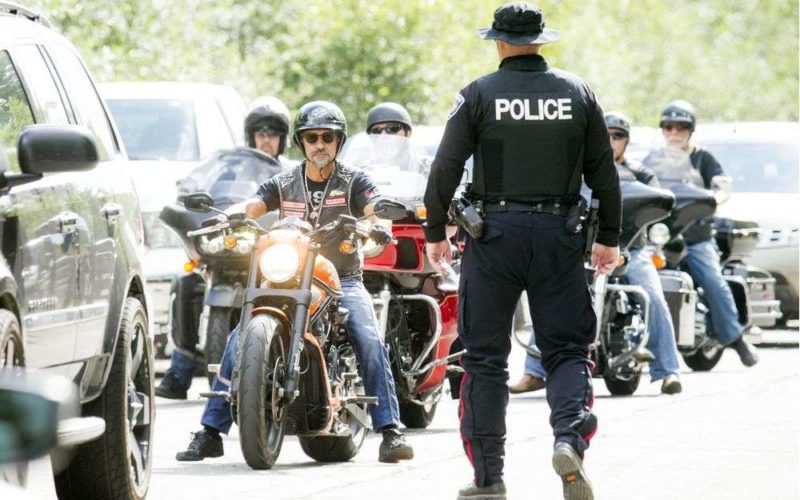Canberra’s once powerful bikie clubs are in disarray with the number of patched members cut by half, police say.
Some bikies have been deported, several high-ranking members jailed, while others have fled interstate.
But police warn, despite this, Canberra’s four outlaw clubs are still involved in the majority of the organised crime in the capital.
‘We’re going to continue to disrupt their behaviour’
The number of bikies in Canberra peaked at about 70 in 2018 — when the Rebels, Comanchero, Nomads, Finks and Satudarah all had chapters established in the territory.
But membership has declined across all clubs to a total that now hovers somewhere in the 30s.
ACT Policing’s criminal investigations boss Detective Superintendent Scott Moller said the decline started when the Finks disbanded soon after their arrival in 2018.
“That was a great win for us, it was a great result for the ACT community, having one less organised crime entity within our community,” Detective Superintendent Moller said.
Superintendent Moller said ACT Policing’s bikie-busting unit, Taskforce Nemesis, had since kept up the pressure on the four remaining clubs.
In 2019, police charged 36 motorcycle club members with 80 offences, conducted 35 raids, and seized 12 firearms.
This year, four members have been charged with a total of 26 offences.
And the operations have seen three successive Satudarah chapter presidents locked up in a 12-month period.
Several senior Comancheros have appeared before the courts, including former president Peter Zdravkovic who was the target of a shooting by other Comanchero members.
Meanwhile, the Nomads appear beset by internal divisions, with a Canberra court last week hearing the ACT chapter’s former sergeant-at-arms Alexander Miller had emailed his girlfriend from jail detailing an interstate plan to dethrone national president Michael Clark in a coup.
It is understood the club-hopping Miller — who joined the club when he patched over from the Comancheros — has since been expelled from the Nomads.
Superintendent Moller said the Nomads and Satudarah now have single figure memberships, and the Comancheros have been weakened.
“The infighting only comes from continued pressure — we’re going to continue to disrupt their behaviour and that obviously breeds frustration within the club,” Superintendent Moller said.
“It is a result of the current environment that we have, where members of those groups aren’t completely comfortable.
“That’s exactly what I want … the ability for them not to be able to be united is exactly what I’m striving for.”
Four bikies deported, or about to be
Superintendent Moller attributed the weakening of bikie clubs to tough new legislation, including crime scene powers, and cross-agency cooperation, which has seen joint operations with WorkSafe and other parts of the bureaucracy.
He said the decline in numbers could also be attributed to ACT Policing’s work to stymie clubrecruitment and the deportation of convicted club members who are not Australian citizens.
Four bikies have been or are in the process of being deported, Superintendent Moller said.
Meanwhile, the police force recently focused more energy on connecting with young, vulnerable men who join the clubs — to shatter the false promises of fast money and a culture of brotherhood.
Superintendent Moller warned new members that they would be used to commit the highest-risk and most dangerous tasks.
“That’s their business model, they use young men who have gravitated to those groups and then discard them once they are charged by the police,” he said.
ACT battle against bikies part of international war
Despite the success, Superintendent Moller warned against complacency.
He said the clubs would continue to operate as long as there was money to be made from crime.
“What that does for me is it gives me the confidence to say that the organised crime activity by these clubs is minimal now, and that’s the important part, their reach into the community has been minimised,” he said.
“I’m certainly not going to say [the war is] won — it’s going to be a perpetual war and it’s not just won here.
“It’s a national and international war that we’re fighting, that law enforcement agencies are fighting continually, [but] we’re on the front foot and we’re doing all we can.”
You can discuss this material in our Facebook group!
Source: ABC
